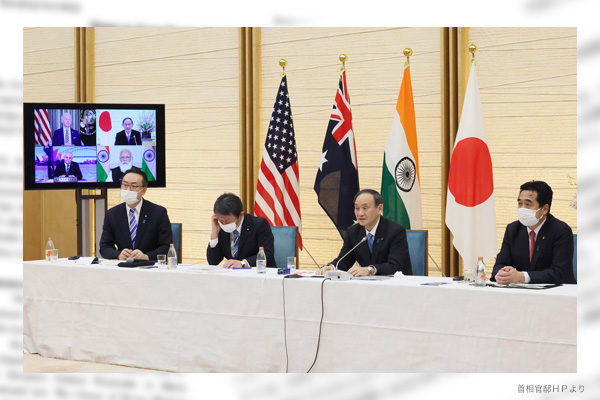It is significant that the quadrilateral group comprising Japan, Australia, India and the United States held its first-ever leaders’ summit in a teleconference format on March 12 to demonstrate the unity of the democracies in the Indo-Pacific region and to take a major step in deterring China. China has been concerned on the unity and expansion of the group, or the Quad, as it has challenged free world order and tried to fill power vacuum created by the absence of the U.S. in the international arena. The four countries will hold an in-person summit by the end of this year apart from a foreign ministers’ meeting to explore a regional security framework.
Considering India’s hope to prevent the Quad from being taken as a network to contain China, the U.S. Biden administration that seeks to enhance relations with allies and partners gave priority to the unity of the four countries at the summit by setting up a broad range of agendas from support for the production and distribution of vaccines against Wuhan coronavirus to cooperation regarding key technologies and climate change countermeasures. Particularly, the four leaders agreed that India will produce vaccines developed by a major U.S. drug company while receiving financial support from the other three. The agreement on vaccines as strategic goods will become a policy model for Quad cooperation.
Regularize joint naval exercise
On the occasion of the summit, the four countries released their joint statement titled “The Spirit of the Quad,” declaring that they are “united in a shared vision for the free and open Indo-Pacific.” While emphasizing democratic values and the rule of law, the statement in an apparent reference to China noted that the four countries strive for a region that is “unconstrained by coercion.” “We will continue to… facilitate collaboration, including in maritime security, to meet challenges to the rules-based maritime order in the East and South China Seas,” the statement said in a manner to jab at China. It was appropriate that Japanese Prime Minister Yoshihide Suga expressed his strong opposition to an attempt to unilaterally change the status quo, in regard to China Coast Guards ships’ intrusions into Japan’s territorial waters around the Senkaku Islands.
In November 2020, Australia joined Malabar naval exercise along with India, the U.S. and Japan for the first time in 13 years. The Quad should regularize the quadrilateral naval exercises. Last year, South Korea, Vietnam and New Zealand joined the four countries to hold a Quad-plus video conference on novel coronavirus countermeasures, expanding a framework of cooperation.
The Biden administration recognizes the erosion of conventional deterrence capabilities against China through Beijing’s military buildup, as indicated by U.S. Indo-Pacific Command Commander Adm. Philip S. Davidson in his testimony at the Senate Armed Services Committee. The administration is expected to build on Quad cooperation to lead its “Pacific Deterrence Initiative” in a bid to counter China.
Democratic security diamond
Japan needs to make an appeal to the international community about China Coast Guards ships’ intrusions into its territorial waters around the Senkakus and the China Coast Guards law’s violation of international law. India faces tensions over China’s salami-slicing invasion into Indian territories along the northern border and Chinese military research ships’ operation in the Indian Ocean. Australia faces a threat of its marine resources being exploited by Chinese fishing fleets appearing in waters off Papua New Guinea.
The four countries are thus required to have deterrence capabilities against China, indicating that Quad may meet the requirements for being established as a security framework. The Quad members account for a half of global defense spending and one-third of global population and GDP. The four democracies’ “diamond-shaped” unity would provide a power balance against China.
Hiroshi Yuasa is a Planning Committee member and a senior fellow at the Japan Institute for National Fundamentals. He is a columnist for the Sankei Shimbun newspaper.


